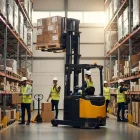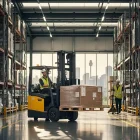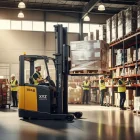What Is Forklift Safety Training and Why Is It Important?
Forklift safety training is designed to educate operators on the safe handling and operation of forklifts. This type of training is crucial to ensure the safety of the operator and everyone around them. Providers like Active Forklift, offer resources and support to ensure operators are well-prepared. The training typically covers several key areas that are fundamental to both novice and experienced operators, equipping them with the necessary skills and knowledge to handle forklifts responsibly and effectively. Comprehensive training programs are tailored to address the specific needs of different work environments, thereby reducing the risk of accidents and enhancing overall safety.
What Do Operators Learn in Forklift Training?
Training begins with the fundamentals of operating a forklift, including starting and stopping the vehicle, steering, and maneuvering in tight spaces. Understanding these basics is essential for safe operation. Operators learn how to adjust to varying load weights and sizes, which affects stability and maneuverability. Additionally, the training emphasises the importance of familiarity with the specific model of forklift being used, as different models may have unique controls and handling characteristics. Mastery of basic operations lays the foundation for advanced skills, enabling operators to handle more complex tasks safely.
What Regulations and Safety Standards Must Operators Follow?
Operators must be familiar with forklift safety regulations to ensure compliance and safety. This includes understanding speed limits, weight capacities, and the importance of wearing personal protective equipment (PPE). Training also covers the legal aspects of forklift operation, such as the Occupational Safety and Health Administration (OSHA) guidelines, which dictate how forklifts should be used in various settings. Operators are taught to recognise and respect the limits of their equipment and environment, preventing unsafe practices that could lead to accidents. Adhering to these regulations not only ensures safety but also helps avoid costly fines and legal issues.
How Do Operators Identify and Manage Workplace Hazards?
Training includes identifying potential hazards in the workplace, such as uneven surfaces, pedestrian traffic, and overhead obstructions. Operators learn how to navigate these hazards safely. They are also trained to anticipate potential risks and to develop proactive strategies to avoid accidents. This includes conducting pre-operation inspections to ensure the forklift is in good working condition and identifying any workplace changes that could introduce new hazards. Developing a keen sense of hazard awareness is critical for operators, as it enables them to react swiftly and effectively in dynamic and potentially dangerous environments.
What Should Operators Do in Emergencies?
In the event of an accident or emergency, operators must know the appropriate response procedures. Training covers how to handle such situations effectively to minimise harm. This includes understanding emergency shutdown procedures, evacuation routes, and first aid measures. Operators are also trained to communicate effectively during emergencies, ensuring that all team members are informed and coordinated. Regular emergency drills and simulations are an essential part of this training, helping operators to remain calm and composed under pressure, thus reducing the risk of panic-induced errors.
What Are the Licensing Requirements for Forklift Operators?
In many countries, obtaining a forklift operator’s license is mandatory. The requirements can vary, but generally include a series of evaluations to ensure that operators are both knowledgeable and competent in their roles. Licensing serves as a formal recognition of an operator’s ability to handle a forklift safely and is a crucial step in promoting workplace safety and compliance with national and international standards.
What Are the Eligibility and Health Requirements?
Operators must be of legal age, typically 18 years or older, and must meet certain health standards. Good vision, hearing, and physical fitness are often required to operate a forklift safely. These health requirements ensure that operators have the physical capability to handle the demands of forklift operation, which can be strenuous and require quick reflexes. Regular health checks are also recommended to ensure ongoing fitness for duty, particularly for operators who may be exposed to hazardous substances or environments. Employers are responsible for ensuring that operators meet these standards before they are allowed to operate machinery.
What Training and Certification Steps Are Involved?
Operators must complete a certified forklift training course. These courses are designed to provide comprehensive training on forklift operation and safety. A practical test is usually required to demonstrate proficiency. The training often includes a combination of classroom instruction and hands-on practice, allowing operators to apply what they’ve learned in a controlled environment. Certification is a formal acknowledgment of an operator’s competence, and it is typically recognised by employers as a critical qualification for employment. Ongoing education and refresher courses are also encouraged to keep skills sharp and up-to-date with new technologies and regulations.
Do Operators Need to Pass a Written Exam?
In addition to practical testing, operators may be required to pass a written exam that tests their knowledge of forklift safety regulations and operating procedures. This exam ensures that operators understand the theoretical aspects of forklift operation, such as load calculations and hazard recognition. The written exam also assesses an operator’s knowledge of regulatory requirements, ensuring that they are aware of the legal implications of their actions. Successfully passing this exam is a testament to an operator’s comprehensive understanding of the principles and practices essential to safe forklift operation.
How Often Must Forklift Licences Be Renewed?
Forklift licenses often require periodic renewal and recertification to ensure operators stay updated with the latest safety practices and regulations. This process involves re-evaluating an operator’s skills and knowledge to ensure they remain competent in their role. Recertification typically includes a refresher course and a practical demonstration of skills. This ongoing process helps to reinforce safety practices and adapts to any changes in technology or regulations that may affect forklift operation. Employers benefit from having operators who are consistently up-to-date, thereby reducing the risk of accidents and maintaining compliance with safety standards.
What Are the Best Practices for Forklift Safety?
Adhering to best practices for forklift safety is essential to prevent accidents and injuries. Here are some key practices to implement that can significantly enhance the safety and efficiency of forklift operations in any workplace. By integrating these practices into daily operations, companies can foster a culture of safety and accountability among their employees.
Why Are Inspections and Maintenance Important?
A forklift inspection checklist should be used to perform regular checks on the equipment. This includes checking brakes, lights, horns, steering, and hydraulic systems. Regular inspections help identify potential issues before they become serious problems. These inspections should be documented meticulously to provide a track record of maintenance and compliance with safety regulations. Operators should be trained to perform basic inspections themselves, empowering them to take an active role in maintaining equipment safety. This proactive approach can prevent costly repairs and downtime, ensuring that forklifts are always ready for safe operation.
A well-maintained forklift is a safe forklift. Establish a forklift maintenance schedule to ensure regular servicing and repairs. This includes routine oil changes, tire inspections, and battery maintenance. Scheduled maintenance not only extends the lifespan of the forklift but also enhances its performance and safety. By adhering to a strict maintenance schedule, companies can avoid unexpected breakdowns that could lead to operational delays or accidents. Partnering with professional maintenance services can provide expert support and ensure that all aspects of the forklift’s operation are thoroughly checked and maintained.
Why Is Proper Load Management Critical?
Operators must be trained in proper load management to prevent tipping or dropping loads. This includes understanding load capacities, securing loads correctly, and using attachments safely. Training should emphasise the importance of balance and stability, particularly when navigating uneven surfaces or inclines. Operators should also be familiar with the specific features of different forklifts and how these affect load handling. Proper load management is crucial not only for safety but also for efficiency, as it minimises the risk of damage to goods and equipment.
How Can Businesses Build a Safety-First Culture?
A safety-first culture encourages all employees to prioritise safety in all operations. Regular safety meetings, training refreshers, and encouraging open communication about safety concerns can help foster this culture. Management should lead by example, demonstrating a commitment to safety in all aspects of operations. By recognising and rewarding safe behavior, companies can motivate employees to adhere to safety protocols consistently. A strong safety culture not only reduces the risk of accidents but also enhances employee morale and productivity, as workers feel valued and protected.
What Do Australian Regulations Say About Forklift Safety?
In Australia, forklift safety is governed by strict regulations designed to protect operators and other workers. These regulations include comprehensive guidelines that ensure all aspects of forklift operation are conducted safely and responsibly. By adhering to these regulations, companies can create a safer work environment and avoid legal repercussions associated with non-compliance.
What Are the WHS Laws and Risk Assessment Requirements?
Forklift operators and employers must comply with WHS laws that set standards for workplace safety. This includes providing proper training, maintaining equipment, and ensuring a safe working environment. WHS laws are designed to prevent workplace injuries and illnesses by promoting safe practices and conditions. Employers are responsible for implementing these laws and ensuring that all employees are aware of their rights and responsibilities under the WHS framework. Regular audits and safety assessments are essential to ensure ongoing compliance and to identify areas for improvement.
Employers are required to conduct risk assessments to identify potential hazards and implement measures to mitigate these risks. This includes ensuring that all operators are trained and certified. Risk assessments involve evaluating the work environment, equipment, and procedures to determine potential dangers and implementing strategies to minimise them. By conducting regular risk assessments, companies can proactively address safety concerns and adapt their practices to changing conditions. Involving employees in this process can also provide valuable insights and foster a sense of shared responsibility for safety.
Why Is Record-Keeping Important for Compliance?
Proper documentation of training, inspections, and maintenance is crucial for compliance with safety regulations. Employers must keep accurate records to demonstrate compliance in the event of an audit or inspection. These records provide a detailed account of safety measures and practices, serving as evidence that a company is adhering to WHS laws. Effective record-keeping also facilitates continuous improvement by allowing companies to track safety performance over time and identify trends or areas for enhancement. By maintaining comprehensive documentation, companies can build a culture of transparency and accountability.
Final Thoughts: Why Forklift Safety Training Matters
Forklift safety training and adherence to licensing requirements are essential components of workplace safety. By following best practices, conducting regular inspections, and fostering a safety-first culture, businesses can significantly reduce the risk of accidents and injuries associated with forklift operation. Investing in comprehensive forklift training courses and staying informed about the latest forklift safety regulations will ensure that operators are well-prepared to handle their responsibilities safely and effectively.
Remember, safety is a shared responsibility. By working together, operators, employers, and safety officials can create a safer working environment for everyone involved. Continuous education and communication are key to maintaining high safety standards and adapting to new challenges in the workplace. A commitment to safety not only protects workers but also enhances operational efficiency and company reputation, contributing to long-term success.
For more information, visit our website Active Forklift.




